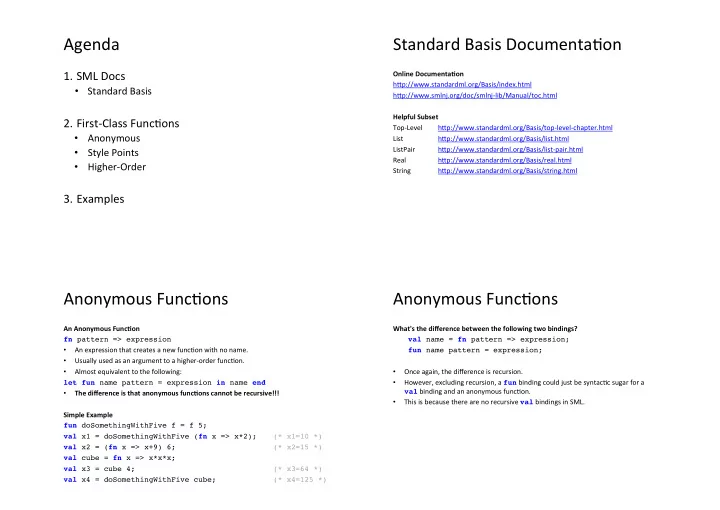

Agenda ¡ Standard ¡Basis ¡Documenta8on ¡ 1. SML ¡Docs ¡ Online ¡Documenta.on ¡ hFp://www.standardml.org/Basis/index.html ¡ • Standard ¡Basis ¡ hFp://www.smlnj.org/doc/smlnj-‑lib/Manual/toc.html ¡ ¡ Helpful ¡Subset ¡ 2. First-‑Class ¡Func8ons ¡ Top-‑Level ¡ ¡hFp://www.standardml.org/Basis/top-‑level-‑chapter.html ¡ ¡ • Anonymous ¡ List ¡ ¡ ¡hFp://www.standardml.org/Basis/list.html ¡ ¡ ListPair ¡ ¡ ¡hFp://www.standardml.org/Basis/list-‑pair.html ¡ ¡ • Style ¡Points ¡ Real ¡ ¡ ¡ ¡hFp://www.standardml.org/Basis/real.html ¡ ¡ • Higher-‑Order ¡ String ¡ ¡ ¡hFp://www.standardml.org/Basis/string.html ¡ ¡ 3. Examples ¡ Anonymous ¡Func8ons ¡ Anonymous ¡Func8ons ¡ An ¡Anonymous ¡Func.on ¡ What's ¡the ¡difference ¡between ¡the ¡following ¡two ¡bindings? ¡ fn pattern => expression � � val name = fn pattern => expression; � An ¡expression ¡that ¡creates ¡a ¡new ¡func8on ¡with ¡no ¡name. ¡ • � fun name pattern = expression; � • Usually ¡used ¡as ¡an ¡argument ¡to ¡a ¡higher-‑order ¡func8on. ¡ Almost ¡equivalent ¡to ¡the ¡following: ¡ Once ¡again, ¡the ¡difference ¡is ¡recursion. ¡ • • • However, ¡excluding ¡recursion, ¡a ¡ fun ¡binding ¡could ¡just ¡be ¡syntac8c ¡sugar ¡for ¡a ¡ let fun name pattern = expression in name end � val ¡binding ¡and ¡an ¡anonymous ¡func8on. ¡ • The ¡difference ¡is ¡that ¡anonymous ¡func.ons ¡cannot ¡be ¡recursive!!! ¡ • This ¡is ¡because ¡there ¡are ¡no ¡recursive ¡ val ¡bindings ¡in ¡SML. ¡ ¡ Simple ¡Example ¡ fun doSomethingWithFive f = f 5; � val x1 = doSomethingWithFive ( fn x => x*2); � (* x1=10 *) � val x2 = ( fn x => x+9) 6; � � � � � � � (* x2=15 *) � val cube = fn x => x*x*x; � val x3 = cube 4; � � � � � � � � � (* x3=64 *) � val x4 = doSomethingWithFive cube; � � � � (* x4=125 *) �
Anonymous ¡Func8ons ¡(cont.) ¡ Unnecessary ¡Func8on ¡Wrapping ¡ Previous ¡Example ¡ What's ¡the ¡difference ¡between ¡the ¡following ¡two ¡expressions? ¡ fun n_times (f,n,x) = � if n=0 � � � � � � � � then x � ¡vs. ¡ � ( fn xs => tl xs) � � � tl � � � � � � � else f (n_times (f, n–1, x)); � ¡ � STYLE ¡POINTS! ¡ fun square x = x*x; � fun increment x = x+1; � ¡ � • Other ¡than ¡style, ¡these ¡two ¡expressions ¡result ¡in ¡the ¡exact ¡same ¡thing. ¡ val x1 = n_times (square, 2, 3); � However, ¡one ¡creates ¡an ¡unnecessary ¡func8on ¡to ¡wrap ¡ tl . ¡ • val x2 = n_times (increment, 4, 7); � • This ¡is ¡very ¡similar ¡to ¡this ¡style ¡issue: ¡ val x3 = n_times (tl, 2, [4,8,12,16,20]); � ¡ � vs. ( if ex then true else false) � � � ex � With ¡Anonymous ¡Func.ons ¡ val x1 = n_times ( fn x => x*x, 2, 3); � val x2 = n_times ( fn x => x+1, 4, 7); � val x3 = n_times ( fn xs => tl xs, 2, [4,8,12,16,20]);(*Bad Style*) � Higher-‑Order ¡Func8ons ¡ Defining ¡ map ¡and ¡ filter � A ¡func8on ¡that ¡returns ¡a ¡func8on ¡or ¡takes ¡a ¡func8on ¡as ¡an ¡argument. ¡ • map � ¡ fun map (f, lst) = � Two ¡Canonical ¡Examples ¡ � case lst of � • map : ('a -> 'b) * 'a list -> 'b list � � � [] => [] � – Applies ¡a ¡func8on ¡to ¡every ¡element ¡of ¡a ¡list ¡and ¡return ¡a ¡list ¡of ¡the ¡resul8ng ¡ � � | x::xs => f x :: map (f,xs) � values. ¡ � – Example: ¡ map (fn x => x*3, [1,2,3]) === [3,6,9] � filter � • filter : ('a -> bool) * 'a list -> 'a list � fun filter (f, lst) = � – Returns ¡the ¡list ¡of ¡elements ¡from ¡the ¡original ¡list ¡that, ¡when ¡a ¡predicate ¡ � case lst of � func8on ¡is ¡applied, ¡result ¡in ¡true. ¡ � � [] => [] � – Example: ¡ filter (fn x => x>2, [~5,3,2,5]) === [3,5] � � � | x::xs => if f x � ¡ � � � � then x:: filter (f, xs) � Note: ¡ List.map ¡and ¡List.filter ¡are ¡similarly ¡defined ¡in ¡SML ¡but ¡use ¡currying. ¡We'll ¡cover ¡ � � � � else filter (f, xs) � these ¡later ¡in ¡the ¡course. ¡
Broader ¡Idea ¡ Tree ¡Example ¡ Func.ons ¡are ¡Awesome! ¡ (*Generic Binary Tree Type *) � • SML ¡func8ons ¡can ¡be ¡passed ¡around ¡like ¡any ¡other ¡value. ¡ datatype 'a tree = Empty � They ¡can ¡be ¡passed ¡as ¡func8on ¡arguments, ¡returned, ¡and ¡even ¡stored ¡in ¡data ¡ • � � � � � | Node of 'a * 'a tree * 'a tree � structures ¡or ¡variables. ¡ � • Func8ons ¡like ¡ map ¡are ¡very ¡pervasive ¡in ¡func8onal ¡languages. ¡ (* Apply a function to each element in a tree. *) � – A ¡func8on ¡like ¡ map ¡can ¡even ¡be ¡wriFen ¡for ¡other ¡data ¡structures ¡such ¡as ¡ trees. ¡ val treeMap = fn : ('a –> 'b) * 'a tree –> 'b tree � ¡ � Returning ¡a ¡func.on ¡ (* Returns � true iff the given predicate returns fun piecewise x = if x < 0.0 � true when applied to each element in a tree. *) � � � � � � then fn x => x*x � val treeAll = fn : ('a –> bool) * 'a tree –> bool � � � � � � else if x < 10.0 � � � � � � � � then fn x => x / 2.0 � � � � � � � � else fn x => 1.0 / x + x �
Recommend
More recommend